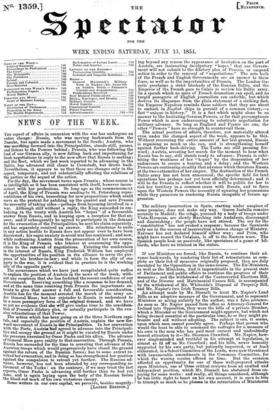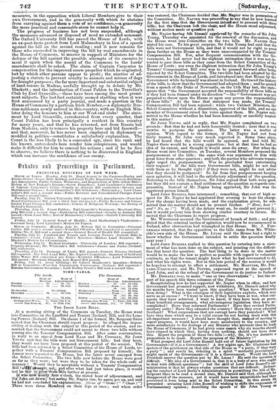If our Ministers are forced, like Russia, to continue their
ad- vance backwards, by rendering their list of retractations as com- plete as their list of measures originally proposed, they are duly emulated by the Opposition in the same course. The Ex-Ministers, as well as the Ministers, find it impracticable in the present state of Parliament and public affairs to continue the progress of their measures ; and the withdrawal of the Controverted Elections Bill, and of the Divorce and Matrimonial Causes Bill, is accompanied by the withdrawal of Mr. Whiteside's Disposal of Property Bill, and Mr. Napier's two Irish Tenancy. Bills.
An attempt made by Mr. Disraeli to treat Mr. Napier's Land Bills as an adoptive measure of the Government, and to represent Ministers as acting unfairly by the author, was a false pretence. As soon as Mr. Napier passed from office as Attorney-General for Ireland into Opposition, they were the bills of a private Member, which a Minister or the Government might approve, but which not being deemed essential at the particular time, he or they might pa- tronize and aid without adopting. The subject is one, it seems, upon which men cannot possibly agree. Perhaps that person who would the least be able to command the suffrages for a measure of his own is the man who has paid most earnest and undoubtedly honest attention to it—Mr. Sharman Crawford. Mr. Napier, how- ever singleminded and truthful in his attempt at legislation, is almost as ill off as Mr. Crawford ; and his bills, never honestly supported by his own party, but patiently improved, or at least elaborated, in a Select Committee of the Lords, were now threatened with innumerable amendments in the Commons Committee, for which the waning session offered no time. But the occasion afforded an opportunity for one of those well-prepared attacks upon Ministers, one of those critical reviews from an exalted and independent position, which Mr. Disraeli has abstained from en- joying for some weeks : and really, all things considered, although he has little right to boast on his own account, it is open to him to triumph as much as he pleases in the retract:tit-ion of Ministerial measures, in the opposition which Liberal Members give to their own Government, and in the generosity with which he abstains from carrying againsethem a vote of no confidence,--a generosity the more practical and reasonable since he cannot help it. The progress of business has not been suspended, although the measures advanced or disposed of need no extended-oomment. The Oxford University Bill has passed the House of Lords, with an ex-post-facto protest from Lord Malmesbury in lien of a speech against the bill on the second reading ; and it now remains for those who succeeded in improving the bill by real amendments in the House of Commons, to muster in support of Ministers for the defence of the bill against the possible attempts of its enemies to maul it again when the assent of the Commons to the Lords' amendments shall be asked. The claim of Captain Carpenter to compensation for the improved screw-propeller which he originated, but by which other persons appear to profit ; the niceties of ad- justing a statute to prevent cruelty to animals and misuse of dogs for draught purposes ; the far more important and substantial subject of land-tenure in Madras, usefully brought up in debate by Mr. Blaekett ; and the introduction of Count Pahlen to the Traveller's Club by Earl Granville,—these have been among the most promi- nent subjects. The last fact certainly seemed startling When it was first announced by a party journal, and made a question in the House of Commons by a partisan Irish Member,—a diplomatic Rus- sian nobleman newly arrived in this country, with an English Min- ister doing the honours to him at our West-end clubs! The state- ment by Lord Granville, corroborated from every quarter, that Count Pahlen has been principally a resident in this country for many years, and that he has returned, not from Russia but from Madeira, only to remove his property here and bid farewell— and that, moreover, he has never been employed in diplomacy or meddled in politics—constitutes a satisfactory explanation. The Count is the less likely to be a concealed spy, since his rank and his known antecedents here render him conspicuous, and would make it difficult for him to conceal his actions ; and if he be free to observe, we believe there is nothing to be discovered in England which can increase the confidence of our enemy.



























